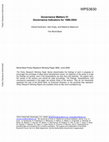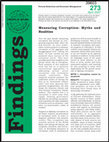Papers by Massimo Mastruzzi
encourage the exchange of ideas about development issues. An objective of the series is to get th... more encourage the exchange of ideas about development issues. An objective of the series is to get the findings out quickly, even if the presentations are less than fully polished. The papers carry the names of the authors and should be cited accordingly. The findings, interpretations, and conclusions expressed in this paper are entirely those of the authors. They do not necessarily represent the view of the World Bank, its Executive Directors, or the countries they represent.
Over the past decade measuring corruption has become an ever-growing empirical field. Since the m... more Over the past decade measuring corruption has become an ever-growing empirical field. Since the mid-nineties, we have undertaken various projects to measure corruption at the aggregate and disaggregated level. At the aggregate level, we have been constructing the Worldwide Governance Indicators that capture six dimensions of governance: Voice and

This paper presents the latest update of our aggregate governance indicators, together with new a... more This paper presents the latest update of our aggregate governance indicators, together with new analysis of several issues related to the use of these measures. The governance indicators measure the following six dimensions of governance: (i) voice and accountability; (ii) political Instability and violence; (iii) government effectiveness; (iv) regulatory quality; (v) rule of law, and, (vi) control of corruption. 2004. They are based on several hundred individual variables measuring perceptions of governance, drawn from 37 separate data sources constructed by 31 organizations. We present estimates of the six dimensions of governance for each period, as well as margins of error capturing the range of likely values for each country. These margins of error are not unique to perceptions-based measures of governance, but are an important feature of all efforts to measure governance, including objective indicators. In fact, we provide examples of how individual objective measures provide ...

We contribute to the field of urban governance and globalization through an empirically-based exp... more We contribute to the field of urban governance and globalization through an empirically-based exploration of determinants of performance of cities. We construct a preliminary worldwide database for cities, containing variables and indicators of globalization (at the country and city level), city governance, city performance (access and quality of infrastructure service delivery), as well as other relevant city characteristics. This city database, encompassing hundreds of cities worldwide, integrates existing data with new data gathered for this research project. We present a very simple conceptual framework and a set of hypotheses, and then test them econometrically. The findings suggest that good governance and globalization (at both the country as well as at the city level) do matter for city-level performance in terms of access and quality of delivery of infrastructure services. We also find that globalization and good city governance are significantly related with each other. Th...
This paper reports on the 2009 update of the Worldwide Governance Indicators (WGI) research proje... more This paper reports on the 2009 update of the Worldwide Governance Indicators (WGI) research project, covering 212 countries and territories and measuring six dimensions of governance between 1996 and 2008:
In this note we summarize some recent critiques of our project to develop Worldwide Governance In... more In this note we summarize some recent critiques of our project to develop Worldwide Governance Indicators, as described in our series of papers (Kaufmann, Kraay and Zoido-Lobatón (1999a,b) and (2001), and Kaufmann, Kraay and Mastruzzi (2004, 2005, and 2006)). The latest round of these governance indicators reports on six dimensions of governance every two years since 1996, and annually between 2002 and 2005, for over 200 countries. For brevity we will refer to them here as the WGI. The WGI have in recent years become widely-used indicators by policymakers and academics.2 The data and accompanying descriptive papers, together with a Web-based interactive graphical tool, are available at www.worldbank.org/wbi/governance/govdata. We address nine specific criticisms of the WGI that are made in three recent
Abstract: The Worldwide Governance Indicators, reporting estimates of six dimensions of governanc... more Abstract: The Worldwide Governance Indicators, reporting estimates of six dimensions of governance for over 200 countries between 1996 and 2005, have become widely used among policymakers and academics. They have also attracted some explicit written criticisms. In this short paper we synthesize eleven critiques offered by four recent papers. We then refute them as either conceptually incorrect or empirically unsubstantiated.

Abstract: This paper describes an ongoing project to measure governance using crosscountry percep... more Abstract: This paper describes an ongoing project to measure governance using crosscountry perceptions data. The governance indicators measure six dimensions of governance and cover 209 countries and territories for 1996-2004. They are based on several hundred individual variables measuring perceptions of governance, drawn from 37 separate data sources constructed by 31 different organizations. We present the estimates of governance, and the margins of error capturing the range of likely values for each country. We show how these margins of error should be taken into account when considering cross-country differences and changes over time in governance. We find that in a number of countries the quality of governance improved significantly in the short term. Yet deteriorations also took place in some other countries, while in many there was little change. There has been no worldwide improvement in governance on average. We argue that perceptions-based data provide valuable insights r...
University Press, 2003. We thank the excellent feedback from the conference’s commentator on the ... more University Press, 2003. We thank the excellent feedback from the conference’s commentator on the paper, Simon Johnson, from its convener, Dani Rodrik, and from the conference participants.
Global Corruption Report 2006
1. Voice and Accountability – measuring political, civil and human rights 2. Political Instabilit... more 1. Voice and Accountability – measuring political, civil and human rights 2. Political Instability and Violence – measuring the likelihood of violent threats to, or changes in, government, including terrorism 3. Government Effectiveness – measuring the competence of the bureaucracy and the quality of public service delivery 4. Regulatory Burden – measuring the incidence of market-unfriendly policies 5. Rule of Law – measuring the quality of contract enforcement, the police, and the courts, as well as the likelihood of crime and violence 6. Control of Corruption – measuring the exercise of public power for private gain, including both petty and grand corruption and state capture
This work is a product of the staff of The World Bank with external contributions. The findings, ... more This work is a product of the staff of The World Bank with external contributions. The findings, interpretations, and conclusions expressed in this work do not necessarily reflect the views of The World Bank, its Board of Executive Directors, or the governments they represent. The World Bank does not guarantee the accuracy of the data included in this work. The boundaries, colors, denominations, and other information shown on any map in this work do not imply any judgment on the part of The World Bank concerning the legal status of any territory or the endorsement or acceptance of such boundaries. Nothing herein shall constitute or be considered to be a limitation upon or waiver of the privileges and immunities of The World Bank, all of which are specifically reserved.

The report points out that over the past decade measuring corruption has become an ever-growing e... more The report points out that over the past decade measuring corruption has become an ever-growing empirical field. This empirical analysis questions the traditional notion of viewing the firm as an 'investment climate taker' and thus ignoring the view that powerful conglomerates can also shape the business climate and thus become 'investment climate makers'. The study implies that it is warranted to move away from simply blaming government officials for prevailing corruption, and to question the value of popular initiatives such as voluntary-and often un-monitorable-codes of conduct. In this report, some popular notions are espoused, which either lack clarity or are not backed up by rigorous analysis or evidence. In this article the authors highlight some of the main issues in these debates, in the form of seven myths and their associated realities, and conclude by also pointing to some brief implications for the private sector role in fighting corruption.

Six dimensions of governance are estimated covering 199 countries and territories for four period... more Six dimensions of governance are estimated covering 199 countries and territories for four periods: 1996, 1998, 2000, and 2002. The indicators are based on several hundred individual variables measuring perceptions of governance drawn from 25 data sources constructed by 18 organizations. These individual measures are assigned to categories capturing key dimensions of governance. An unobserved-components model is used to construct six aggregate governance indicators in each of the four periods. Point esti-mates of the dimensions of governance are provided as well as the margins of errors for each country for the four periods. Methodological issues are also addressed, including tests for potential biases, and the interpretation and use of the data, given the estimated margins of errors for the indicators. The data and a Web-based graphical interface are available online at www.worldbank.org/wbi/governance/govdata2002/index.html. This article presents estimates of six dimensions of gov...
Policy Research Working Papers
The Policy Research Working Paper Series disseminates the findings of work in progress to encoura... more The Policy Research Working Paper Series disseminates the findings of work in progress to encourage the exchange of ideas about development issues. An objective of the series is to get the findings out quickly, even if the presentations are less than fully polished. The papers carry the names of the authors and should be cited accordingly. The findings, interpretations, and conclusions expressed in this paper are entirely those of the authors. They do not necessarily represent the views of the International Bank for Reconstruction and Development/World Bank and its affiliated organizations, or those of the Executive Directors of the World Bank or the governments they represent.




Uploads
Papers by Massimo Mastruzzi